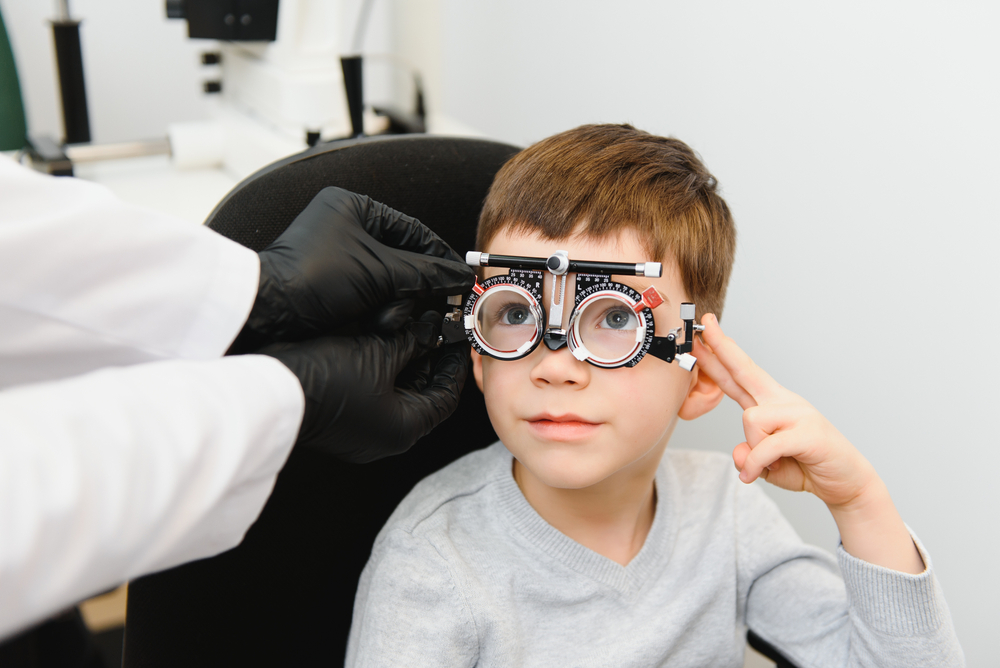
What to Expect During a Pediatric Eye Exam
At NewView Family Eyecare, we believe early eye exams are a vital part of children’s health and development. Just as regular checkups are essential for growth and well-being, eye exams help ensure that kids’ vision is supporting their learning, play, and overall quality of life.
The Importance of Pediatric Eye Exams
Children's vision changes rapidly as they grow, and some eye conditions can go undetected without regular screenings. Early detection of issues like nearsightedness, farsightedness, and eye alignment problems can make a huge difference in a child's success in school and their overall development. Eye exams can identify potential problems before they interfere with learning, social interaction, or physical activity.
What Age Should Kids Have Their First Eye Exam?
The American Optometric Association recommends a comprehensive eye exam at 6 months old, another at age 3, and just before they start school at around age 5 or 6. After that, schedule a routine exam each year. However, if your child shows signs of vision problems, such as squinting, frequent eye rubbing, or difficulty focusing, it may be best to schedule an appointment sooner.
What Happens During a Pediatric Eye Exam?
Each exam is tailored to a child's age and development level, ensuring they feel comfortable throughout. Here’s a general outline of what to expect:
1. Initial Discussion and Health: History We’ll start by discussing your child’s overall health, any developmental milestones, and family vision history. This information helps us understand any factors that may affect their eye health.
2. Vision Assessment: Using fun and age-appropriate tools, our optometrist will check how well your child can see at various distances. For younger children who may not know their letters yet, we use shapes, pictures, and symbols to test vision. Older kids may read letters on a chart.
3. Eye Alignment and Coordination Check: We’ll examine how well your child’s eyes work together. Proper eye alignment and coordination are critical for depth perception and preventing double vision. The doctor will use light and simple exercises to evaluate these areas.
4. Eye Health Examination: The optometrist will assess the health of the internal and external structures of your child’s eyes. We may use gentle drops to dilate the eyes, which allows us to get a clear view of the retina and optic nerve to check for any potential concerns. This is usually a quick and painless process, though the drops may cause temporary blurriness.
5. Refraction Test for Prescriptions: If our exam indicates that your child might need glasses, we’ll perform a refraction test to determine the exact prescription. Kids' eyes change rapidly, so even if glasses aren’t needed now, we may recommend regular follow-ups to monitor any changes.
Tips to Help Your Child Prepare
A child’s first eye exam can be a bit intimidating. Here are a few ways to make it a positive experience:
• Explain the Process: Let your child know that the eye doctor will do some “games” to see how well their eyes work. This can make it feel less clinical and more like an adventure.
• Bring Their Favorite Toy or Book: This can help make them feel comfortable and relaxed.
• Schedule the Exam at the Right Time: Choose a time when your child is most alert and cooperative, usually in the morning or after a nap.
After the Exam: What’s Next?
Once the exam is complete, the optometrist will review the results with you and provide guidance on next steps. If your child needs glasses, we’ll help find frames that suit their style and comfort. If no issues are found, we’ll recommend a schedule for future checkups to keep an eye on their vision health.
Schedule Your Child’s Eye Exam with NewView Family Eyecare
Regular pediatric eye exams are an essential part of maintaining your child’s overall health and development. Dr. Egan is committed to making each visit comfortable, thorough, and positive, ensuring your child’s vision supports them in every step of their growth. By catching any issues early and promoting healthy eye habits, we help set the foundation for a lifetime of clear vision.
Schedule a pediatric eye exam with NewView Family Eyecare and take the first step toward safeguarding your child’s vision for years to come. Visit our office in Waterloo, Iowa, or call (319) 236-2020 to book an appointment today.








